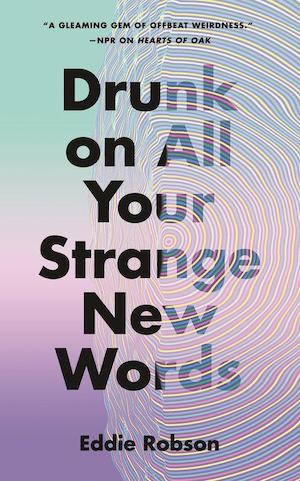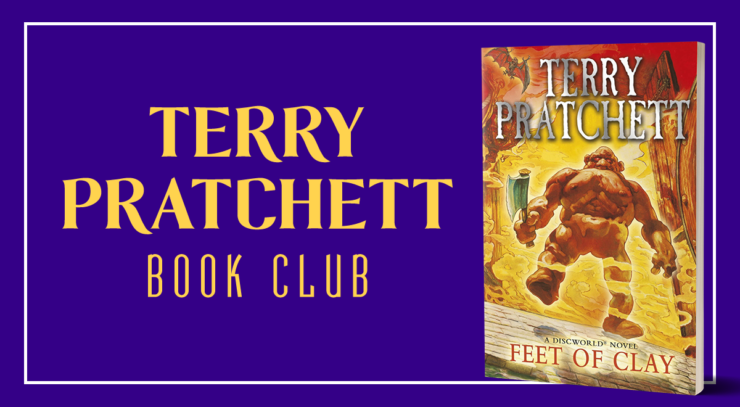Back with the new (and improved?) Ankh-Morpork City Watch! Let’s hit those cobblestones with our cardboard-soled boots…
Summary
A golem arrives at a merchant’s door and offers him a brand new golem to do work for him, continuing to cut the price for him as they talk. The man eventually purchases the golem’s services for thirty dollars, which the other golem gives to a random beggar. A priest dies and a golem lays him to rest. Sam Vimes is shaving when yet another assassination attempt occurs. He heads out to the dragon stalls to confront said assassin and gives him a running shot at survival (after taking his payment for the job). Carrot is writing a letter home on his day off and notes that there’s something off about Ironcrust’s bakery. The curator of the Dwarf Bread Museum is murdered, being beaten to death with a loaf of bread. Vimes gets to the Watch House, and hears reports about several odd murders going on. He meets Cheery Littlebottom, a dwarf who used to be an alchemist, but got kicked out for blowing up the guild. Vimes signs Cheery on to create a new forensics division in the Watch, on a month trial basis. Detritus shows Cheery around and hides a hammer (on account of a Slab dealer talking about police brutality). Carrot and Angua—in wolf form—confront the three fellows leaving Ironcrust’s bakery.
Buy the Book


Drunk on All Your Strange New Words
Vimes arrives for his appointment at the Royal College of Heralds, finding an array of heraldry animals and the men responsible for creating coats of arms by arranging the items on them in life and then painting them. Carrot and Angua stop the thieves, Carrot gets them to agree that they’ll turn themselves into the Thieves Guild for being unlicensed, and Carrot offers to help Mr. Ironcrust with his paperwork, much to the dwarf’s dismay. The Dragon King of Arms, who runs the College of Heralds, is a vampire. He tells Vimes that he cannot have a coat of arms made because there already is a Vimes coat of arms that cannot be revived—because Old Stoneface Vimes executed the last king of Ankh-Morpork. Vimes wants to argue it despite not wanting a coat of arms a moment ago, but there’s nothing for it. Dragon gives Vimes an impromptu lesson on the fine art of heraldry and mentions several fine families of the city… including the Nobbses. It turns out that Nobby is, in fact, the earl of Ankh-Morpork, and Dragon hadn’t known there were any survivors to the line, so he’s incredibly pleased about it.
Angua is thinking how she’ll probably have to break up with Carrot soon on account of people not being good with the werewolf thing. He brings her to the Dwarf Bread Museum, and is surprised that the curator, Mr. Hopkinson, isn’t about—they find his body instead. Vimes arrives at the scene of Father Tubelcek’s murder to find Constable Visit-The-Infidel-With-Explanatory-Pamphlets ready to give out all the details he’s gathered. Vimes notices white clay in two spots, but otherwise the scene is a mystery to him, which he does not like. Corporal Littlebottom arrives to do the very first forensic sweep of a crime scene. There’s the clay, something under the priest’s nails, and Cheery takes pictures of the body, particularly one eye. At the Dwarf Bread Museum, Angua changes into wolf form to try and sniff out clues, but she doesn’t find anything… but once she changes back into the human she notices that one of the smells is familiar, though she isn’t certain how to describe it in ways Carrot can understand. Vimes shows up for his meeting with the Patrician, but once he’s fifteen minutes late, heads to his office door and goes in. He finds Vetinari unconscious and gets him put in bed, calling for Colon. Vimes believes the Patrician was poisoned.
Colon brings Doughnut Jimmy (a horse doctor) to care for the Patrician while Vimes lets the city elites knows about the poisoning and gets to work finding out who it was. He sends Cheery in to figure out how Vetinari was poisoned first; based on some ramblings from the Patrician, it’s discovered to be arsenic in all the fabrics of his room. Nobby shows up to get his dressing down for taking so much time off lately—it turns out that the reason he’s doing it is because he’s a member of the Ankh-Morpork Historical Re-creation Society, and is practicing their reenactment of the Battle of Ankh-Morpork, where he’s playing Lorenzo, last king of the city. (Stoneface Vimes will be played by straw and burned in effigy at the end of the night.) Vimes tells Nobby to take his family ring to the College of Heralds, and then gets the image Cheery got the imp to draw off the priest’s eye: two red, glowing eyes. Carrot and Angua show up to inform him about the murder of Hopkinson. Vimes puts himself on Vetinari’s case, to Carrot’s disappointment (as he doesn’t realize that Vimes is doing it to protect him from suspicion).
Commentary
We’re gonna get into golems later because they’re very sparse in the story to begin with. But I am keen to dive in on that because golems are such an excellent piece of Jewish folklore and magic, and there are questions to be asked in terms of how they’re being used in a story that you could argue is either religiously egalitarian (on account of Discworld’s Death prioritizing the faith of the person who is dying) or slanted toward a Christian worldview (on account of Pratchett being British and the UK being a place where Christianity is so entrenched that it can’t help but be “in the water,” so to speak). Something to look forward to as we go.
Yet again, the Watch stories have such a tight weave to them, and this one has a cinematic quality to it that clips along so well. We’ve got a larger roster of characters to work with, which means we get to keep bouncing back and forth between the ones we know, and the new officers we haven’t been introduced to yet. The biggest change is Vimes accidentally trying to invent forensic science with Cheery’s hiring—he makes the Sherlock Holmes-esque comment of wanting someone who can tell what he smokes by looking at the ash, and Cheery pulls the extremely Holmesian move of knowing instantly… not from the ash, but because his pack was visible on his desk. (Most of Holmes’s deduction is the obvious stuff that other people aren’t paying attention to, after all.)
We’ll get into Cheery later, too, of course. *internal screams of excitement*
Sidenote: Sibyl never shows up as often as I’d like in these books. I understand this is partly down to how Vimes is as a character, but ugh. Quit being so weird about your rich wife, dude, I wanna see more of her and her bizarre dragon-caretaker calling.
Fred Colon is one of the places where Pratchett casually slides in the most bigoted opinions, and I always forget until it rears its ugly head—like Vimes bringing up previous Patricians and Colon responding that Vetinari is better because “at least this one didn’t giggle or wear a dress.” Just, wow guy. He’s always going along and doing the job until something like that drops from his mouth and you think ah yes, it’s past time to retire, Fred.
But the opening of the story is really one big misdirect—much like Cheery’s hiring, in fact, seeming like it’s just about new types of policing when it’s about so much more than that. When Vetinari is poisoned, it’s all about who seems the most likely, and lineage, and how several members of the Watch have specific historical ties that could line them up for suspicion. We’ve got Vimes, we’ve got Carrot, and now Nobbs who have these relevant heritages—Vimes’s being extra hilarious for the clear historical parallel being drawn between his ancestor and Oliver Cromwell, who was known for being such a sunny and lovey guy, historically speaking—in light of the attempt on the Patrician’s life… and we’re only just beginning to get the edges of the real picture.
There’s a discussion in here about Vimes’s reaction to the concept of a king and how primed people are for them. He’s been having this fight with himself since we were introduced to the character, but he’s feeling it extra hard for getting flak on all sides about old Stoneface Vimes. But the true irony in all his grousing is that the Vimes family has also been one with extreme privilege throughout the ages—Stoneface may have been deposed, but he was part of a noble family. Vimes is now married to one of the richest people in the city, and he may gripe about having a butler and how wrong it is for some people to be waited on while others do the waiting, but it doesn’t change the fact that he is Sir Samuel Vimes now.
So, you know. Believing that you’re the person who understands what people can and should do for themselves is an extremely drama queen move in that position. Even if you insist on shaving yourself in the morning. Sorry, Vimes.
Asides and little thoughts:
- I FIND THE BEST APPROACH IS TO TAKE LIFE AS IT COMES. Okay, I know that Death loves a good pun, but this might be the first one that gets a groan from me. Good dad joke, Death.
- Colon clearly thinking that a book about animal husbandry is about marrying animals is sending me right now.
- And a handy footnote about Detritus asking the same question over and over (some variation of “Did you do it?”) is a handy pointer toward how police often badger witnesses into false confessions.
- Constable Visit being Omnian is a great aside, but I confess to being a little disappointed that the revamped version of their religion wound up being like… evangelical Christianity? I dunno, I feel like Brutha was working toward a faith with a different vibe than that…
- Boob jokes generally have to work much harder to pull a laugh from me, and the one about Angua having “the constant nagging feeling that you should be wearing three bras at once” while in wolf form ranks high in my estimation.
- And once again, Pratchett on Team Being-A-Landlord-Is-Bad-Actually: “When Nobby had gone Vimes reached behind the desk and picked up a faded copy of Twurp’s Peerage or, as he personally thought of it, the guide to the criminal classes. You wouldn’t find slum-dwellers in these pages, but you would find their landlords.” Yup.
Pratchettisms:
People look down on stuff like geography and meteorology, and not only because they’re standing on one and being soaked by the other.
The razor was a sword of freedom. Shaving was an act of rebellion.
The one clear thinker looked at Captain Carrot. His armor shone. So did the muscles on his bare arms. Even his knees gleamed.
—the inverted comma dropped neatly around the nickname like an old lady carefully picking up something nasty in a pair of tongs—
However you phrased it, however broadly you applied your definitions, he definitely couldn’t have committed suicide. Not with a loaf of bread.
“They think they want good government and justice for all, Vimes, yet what is it they really crave, deep in their hearts? Only things that go on as normal and tomorrow is pretty much like today.”
Whoever had created humanity had left in a major design flaw. It was its tendency to bend at the knees.
Next week we read up to:
There were some waters too deep to wade.










